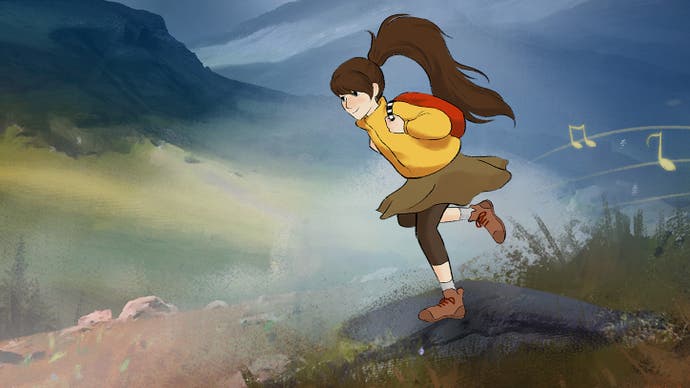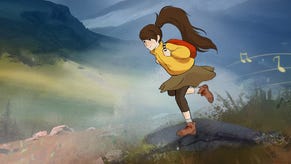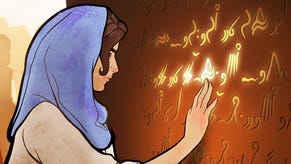A Highland Song captures the joys and dangers of being lost in nature
Scot charm.
A Highland Song is the new game from Inkle, the acclaimed storyteller responsible for Heaven's Vault, 80 Days, Overboard!, Pendragon and the Sorcery! adaptations. And for this adventure, the genre has changed again. It's still a narrative game at heart but it's wrapped in a platforming shell. You play a young lady called Moira who yearns to see the sea and so runs away from home and into - and over - the Scottish Highlands in pursuit of it. You control her running and jumping and climbing, and at points, do so in time to folk music that sporadically bursts from the game.
It's a game inspired by, I believe, the real-life walking adventures of Inkle co-founder Joseph Humfrey, who was once lost out in the Highlands. But it's also inspired by the many literary people who've tried to capture the magic of the Highlands, and of walking, over the course of many, many years. In this piece, Christian Donlan and I play the game and talk about our experiences of it.
A Highland Song is coming to PC and Nintendo Switch "soon" - presumably this year although that has not been confirmed.
Chris: Not to start on too heavy a note, but about 10 years ago when I was diagnosed with MS, I really worried my days of mobility might be numbered. I started to really seek out games about the pleasures of movement - games like Crackdown and the original Tomb Raiders, which felt they were primarily about what it can feel like to run and jump and all that jazz. I think I would have leapt at the chance to play something like Highland Song.
I've been very lucky, and 10 years later I'm still wobbling around on my feet, and if anything I walk even more now, and I'm more attentive to what walking feels like, its particular qualities. So it makes me really curious to play a game that is all about that. Do you think that's a fair way to categorise this game? Is that part of what you think Inkle is getting at here?
Bertie: I think it's absolutely about the joy of movement and moving. A game it really reminds me of, actually, is Mario, in the way you gather speed as you run in one direction, and the way the game wants you to leap over obstructions - as though the most important thing is unobstructed flow and rhythm. I suppose that ties into the game's link with music as well.
I'll quickly explain: there are moments in the game, usually when you're racing down a large slope (and often following a deer) that the game breaks into music, folk music, and you're challenged to press buttons in time with it to, I'm not sure, keep up the flow? It seems like it's a mechanic you use to traverse great distances or up giant slopes. And I think the thinking behind it is the lyricism and feeling of wild abandon you get when racing across hills like these - not that I've ever run up a hill. Why would I do that?
But it seems to be a tricky game to get hold of in terms of what it's really about, if that makes sense?
Chris: YES! And the more I play, the more that's what I like about it. So it's a game about setting off on foot over hills and mountains, but the journey keeps giving you these choices. It starts off feeling like a classic left or right thing, but then you have all these moments where you can move into the screen, as it were, hopping from one 2D plane to another. Alongside this, there's mountain climbing sections and even a bit of spelunking. Movement of one kind flows into another, and then I've been collecting items and finding new bits of map, and stopping to rest and conserve energy and get out of the rain.
What I'm getting at is that there's a load of stuff going on, a load of systems that seem very elegantly channeled through the player deciding where to go next. And after quite a bit of playing I get that lovely dizzying feeling of not knowing the boundaries of the game and what's possible here.
Can I quickly say a thing about flatness? The game has this extraordinary kind of rugged flatness. You climb these 2D mountain slopes, but after a few minutes I really feel like I'm getting a sense of the shifting earth through my fingers and hands. And when you come to shift planes and move from the foreground to the background, to a mountain which I had kind of assumed was just a bit of scenery, there's this magical confusion of 2D and 3D space. To some up: I am delightfully lost in this game. Do you feel lost?
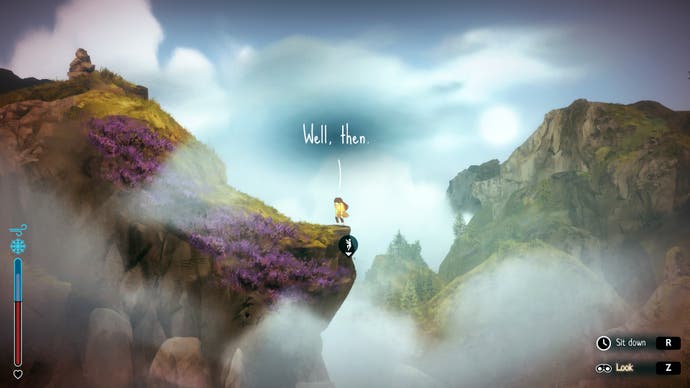
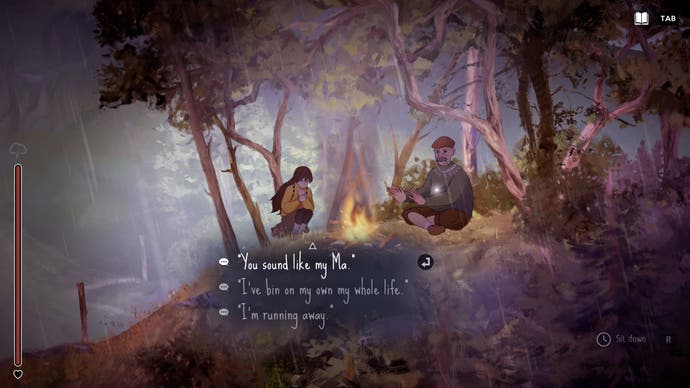
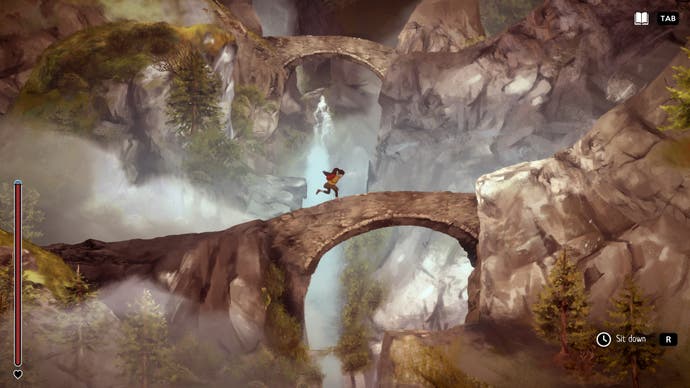
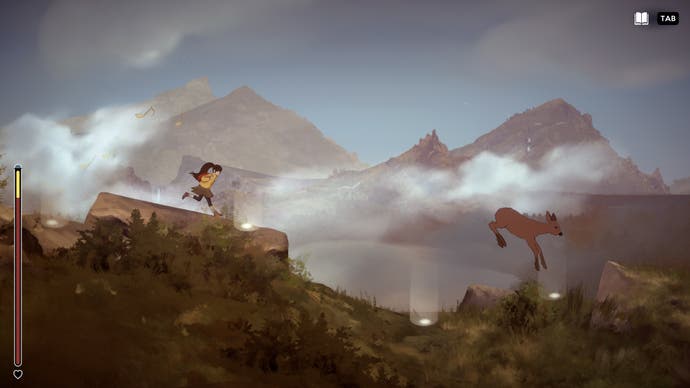
Bertie: Ha ha - absolutely! It's deceptive, isn't it? It doesn't look like it should be very hard - although hard isn't the right word; it doesn't look like it should be very complicated, because it's so overtly friendly in how it looks and the bubbliness of its character. And yet, there's a very natural kind of impenetrability to the hills, or the mountains - I'm not sure how you classify them but they're large, like, dauntingly so. And I love how the only way you can navigate them is by using scribbled maps or - and I particularly love this - folklore. By using the kind of natural wisdom handed down through generations.
And it's this connection to a lineage as long and large as the mountains or hills themselves that captivates me. That there were people in these regions tramping these hills and mountains, building a respectful relationship with them, for countless years before me. How many people have had similar adventures here, or similar thoughts while peering up at the night sky?
You touched on this but I like how the game impresses elemental effects on you too, like cold, rain, and wind, and how you feel so small and vulnerable because of them. This may sound like a silly question but does the game make you feel a little of what it would be like to actually be there, out on those hills?
Chris: Absolutely! But sort of mediated, through the flatness, the animation, the sense of living paint that has brought the mountains and the world to life, down to the fact you can still see individual brushstrokes in places?
I tend to think of Inkle as being sort of literary at heart, and I wonder how much of this game was inspired by something like The Living Mountain, by Nan Shepherd. It's this short but incredibly rich book about the Cairngorms, exploring them, uncovering them, living around them. And it feels very similar to this, not just the Scottishness and the attention to nature, but that sense of approaching a place from so many angles, and being content to be slightly lost within something much larger?
On that note, and to draw things to a sort of close, you know Inkle much better than I do. Do you see a lot of classic Inkle in this? It feels, from what I can see, like a sense of them taking their ideas and simultaneously extending away from them while also boiling something down to its richest expression? It's a new direction, but there's a core that feels classically Inkle?
Bertie: Oh, absolutely. I interviewed the founders of Inkle not that long ago, and it's actually Joseph Humfrey's experience of getting lost in the Highlands I think this game is based on. But it's also, as you said, absolutely literary. I remember the other co-founder Jon Ingold talking about how they'd wrestled with conveying the magic of something like walking in a game, and how they'd reached for literary references to help do that.
But yes, one of the Inkle hallmarks as I see it is elegance in simplicity, and stripping away everything that's not needed - and perhaps it's that which is deceiving, initially, in regards to how much is here. It's a bit like a trifle you thought was only cream to begin with, and then you dove down and found much more there. So much so that a, I really want to eat a trifle now, and b, I'm powerfully intrigued to find out what else A Highland Song has to say.
